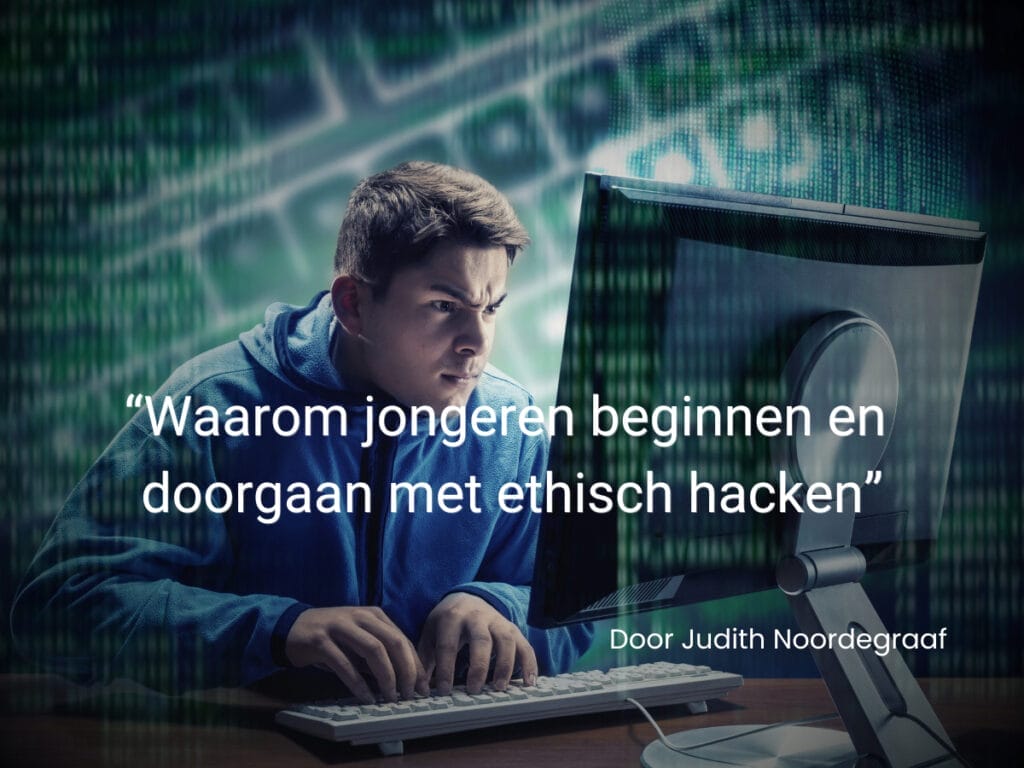We are pleased to announce that NFIR’s own Judith Noordegraaf, in collaboration with Marleen Weulen Kranenbarg, has conducted groundbreaking research on the world of young ethical hackers. Her research sheds light on what drives young people to choose a career in ethical hacking and what continued to motivate them to continue doing so.
The findings of this study reflect our own experience and beliefs at NFIR. Ethical hacking is not just a career, but a moral calling to expose and fix vulnerabilities in the digital world. We are proud that our employees pursue such important research and initiatives.

"The young ethical hackers took a cybersecurity perspective: They felt the need to protect people and systems. According to them, it's just common sense to report a vulnerability when you find one. After all, in the physical world, they would also alert when a front door is open."
Judith Noordegraaf
This research highlights the personal and social aspects involved in young people’s decision to begin and continue ethical hacking. These ethical hackers have a crucial role in protecting our online environment and closing digital doors that would otherwise remain open. We fully support the findings of the study and are committed to a more secure digital future with the help of young ethical hackers.
For the full study:
https://onlinelibrary.wiley.com/doi/10.1111/1745-9133.12650
Concise summary of research.:
Article: ‘Why young people start and continue with ethical hacking’
By
Judith Noordegraaf and Marleen Weulen Kranenbarg
Inthe era of explosive growth in the field of ICT, where digital security is of paramount importance, ethical hacking is emerging as an essential and dynamic field. Ethical hackers, often referred to as “white-hat hackers,” play a crucial role in identifying and fixing vulnerabilities in computer systems, networks and software applications. This research delves into the intriguing world of young ethical hackers and aims to understand why they choose this unique path.
Introduction
Ethical hacking, the practice of identifying and addressing security vulnerabilities within digital systems, is a constantly evolving field. It is a world where individuals use their technical prowess and insatiable curiosity to protect the digital domain. But just what drives young people to embark on this journey? What motivates them to walk the thin tightrope between a
digital vigilante
And a cyber criminal? These questions and more are answered in the study.
Research summary
This qualitative study examined through interviews the individual and social aspects in the lives of 15 hackers who began ethical hacking at an early age, before age 18. The study examines what motivated and prompted them to begin ethical hacking and how and why they went through with it. The results show that individual aspects, such as an early interest in ICT (Information and Communication Technology), motivation to make systems more secure and viewing reporting vulnerabilities as a moral duty, contribute to the onset of ethical hacking. Social aspects, such as role models, mainly play a role in the further development of ethical hackers’ careers. For example, peers, parents, friends and hacker communities have a motivating and stimulating effect on young ethical hackers. Similarly, positive reactions from public and private system owners to reporting the vulnerabilities can further encourage the development and self-image of ethical hackers.
Policy implications
Unlike criminal hackers, ethical hackers improve cybersecurity, such as by reporting weaknesses or flaws in computer systems. Today, more and more public and private organizations around the world are creating cybersecurity policies around ethical hacking. Interest in hacking usually arises at a young age, making it important to gain knowledge about what encourages and motivates young people to start and continue ethical hacking in order to shape these policies more fully. The results show that recognition and responses from system owners are important in the career of ethical hackers. The study’s recommendations may encourage more young people interested in hacking to take the ethical route. This increases the security of public and private organizations, reducing opportunities for criminal hackers.

